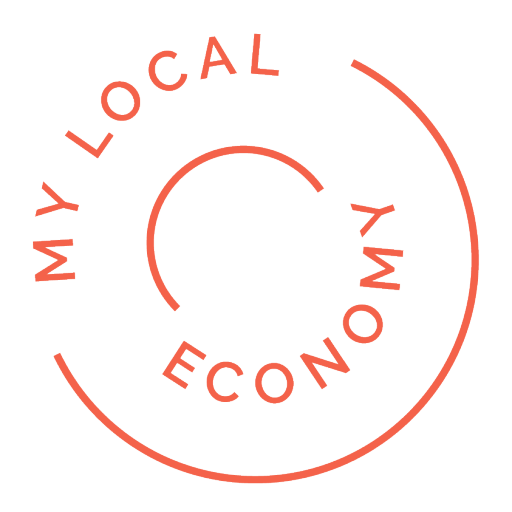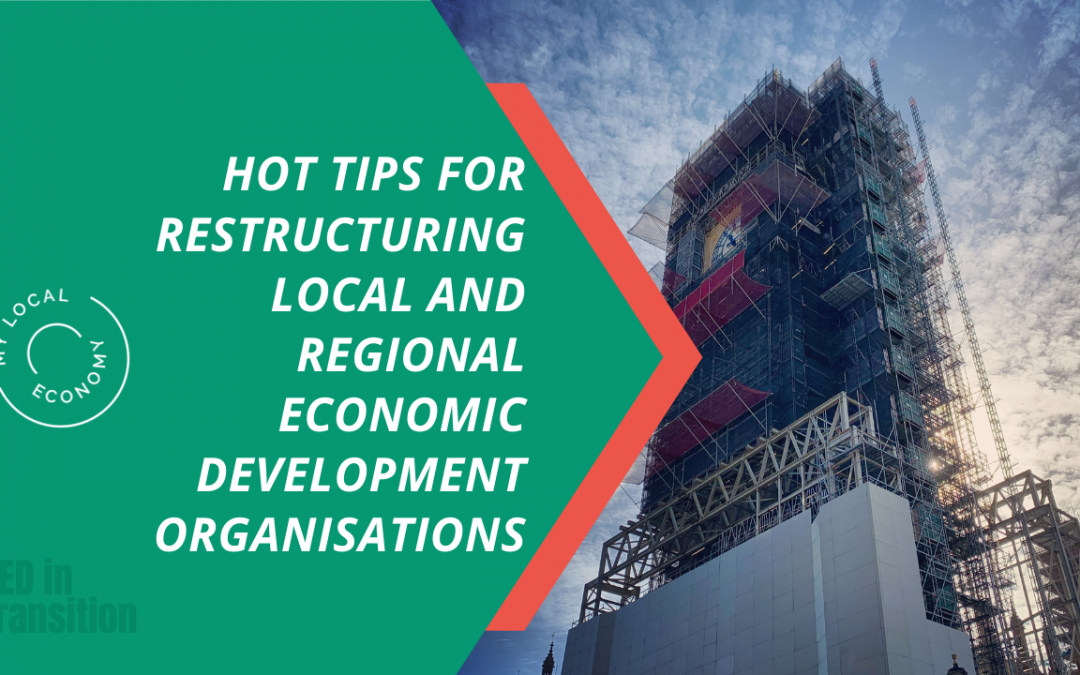I live and work in England in the UK. In such a centralised country, where the national government funds and shapes much of the local economic development landscape, the influence of the political cycle is massive. Whether its a government coming into power fresh from a general election, or the need to boost polls mid-term or one to two years before a general election – rarely do initiatives, funding sources, or institutional formats stay in place for long.
With the demise of Local Enterprise Partnerships (LEPs) as lead strategy, funding and delivery bodies, and the introduction of the UK Shared Prosperity Fund – more change is on the cards.
I’ve been writing articles on organising for local economic development for a good while now. As you will see in my profile, I’ve been lucky enough to research, and work in a whole bunch of economic development organisations both in the UK and abroad. Check out my recent article: Responding to reorganisation: creating the agile economic development community
Here are a few more thoughts on what I’ve learnt about policy and organisational restructuring from past experience…
#1 Say “Yes… and let’s build something even better…”
The latest demands of the UK government involve some challenging conversations and decisions about structures and geographies. But if you want resources for your local economy, you have to accept this and respond constructively.
Far better to say “yes to restructuring, and… we can take some of the learning, capabilities and experiences of the previous structures to build something even better.”
Be part of the solution.
#2 The more things change, the more they stay the same – the challenges remain
Ok so the local economic agency (partnership, trust… etc) is being abolished, the funding regimes have changed, and there’s less money. But the economic needs, issues, and challenges remain, some have accelerated or worsened. And these challenges are rooted in long-standing characteristics of the local economy, its firms, and people.
Whilst us folks that deal with localities on a regular basis know, that, central government often seems to forget or overlook the fact that the social and economic challenges are long-standing and deep-rooted. Sometimes they need reminding, more often we just need to continue dealing with it locally.
So a new strategy – has to be a blend of old challenges, accelerated challenges and new issues – all dressed up in a way that the government of the time will say yes to funding. Presentation can matter a lot, as long as the substance is there behind it.
#3 If you have a board, or political group – avoid recruiting passengers who know nothing of value
Try and pick to ensure they know something about the economy (at least), and economic development and regeneration (hopefully).
Imagine walking into a new role with a lot of knowledge about economic development with bags of experience, learning, and a great network? You go into your senior role thinking – “let’s jump right into cutting edge practice and do some good stuff”. The board, unfortunately, doesn’t really know why they are there, what to do, or how. They are complete beginners at local economic development. This will mean walking them through every choice and decision, putting things into really basic explanations. And then they have to read and understand the board papers. Does this sound unrealistic? Well, it’s happened, actually.
When you look at the challenges facing the local economy and communities these days – would you hire executive staff who knew nothing about it, with no experience? No! so why recruit board members, political or board advisors who know nothing? Why hobble yourselves by having to spend 2-3 years explaining the basics?
And remember – your board members will be the ones advocating for your organisation and its endeavours, and the ones who will be talking to the press. It’s a good idea to offer induction, training, and development to the new board members.
#4 Business board members are valuable – but a board / or committee needs balance – public, private, community, non-profit
I’ve worked with a lot of private sector board members. Driven people, who want to get things done. Many tend to be laser-focused – they come from a business which produces one type of good or service, works in one industry and is focused usually on sales and profits. The economy, and economic development has some elements where this is relevant, but on the whole it isn’t like widget production. It needs politicians, persuaders, and diplomats too – people who are good at explaining and advocating things. Of course I have met business people who have been great at this – and they make fantastic board chairs.
In this day and age – there’s a big move to ensuring community benefits from economic development investments and initiatives. They feel that the millions going into big property deals – don’t touch the sides of any communities they are in. So there will need to be more community representation on any board or committee.
#5 There’s never enough money. Be pragmatic.
There’s never going to be enough money to do everything. But you knew that, didn’t you? Be pragmatic. Fight a few fires, keep advocating for the big and small projects, be tactical about the immediate priorities, and the need to continue to invest in longer-term gains.
#6 Keep some continuity in skills and experience
Most economic development organisations in the UK will be adept and coping with change, rewriting and updating strategies, applying for and operating with central government cash… as well as being great economic development professionals.
As I write in this article, institutional change always creates a hiatus of reduced and stop-start funding, and this can cause organisations to make staff redundant, downsize or close completely. This can kill institutional memory and capacity. Local economic development is complex, and requires a mix of high-level skills to be effective. The knowledge that has built up in teams over many years, and the networks established with local and national stakeholders cannot be replaced quickly or easily. Those localities who manage to retain knowledge and staff – will be in a better position once the national policies and new institutional arrangements start to kick in.
#7 Get some early wins in
You will need time to bed-in your new organisastion or approach. But you should get some early wins. Even if this is accessing funding, grants, etc. Or getting on the coattails of a major new inward investment project. Act like winners that mean business. A lot of fuss gets created when institutional change happens, and too often nothing happens for a year. Don’t do that – keep some momentum going – even if it’s building profile through events, debates, and influencing.
This needs said (even from someone doing a lot of work on strategies and networks!) – delivery is key. And any softer initiatives such as strategies need to be balanced with some direct delivery and results, particularly in the short-term. And you need to deliver confidence – that you are doing your best for the local economy. Sure, it takes time to get fully operational – but you can inspire confidence from the start.
Don’t fall into the trap of the UK central government – that the first action you will do to launch your new policy – is to conduct a year-long review! (and nothing else).
#8 A local investment plan will need to combine known needs and service models, with the agility to adapt and change to the economy and new policy directives
Any plan will be a mix of a) the well-known issues and delivery options; b) known issues that need to be worked up; c) pet projects by influential people or groups; and d) the need for some agility and responsiveness.
If we read the financial pages of the more decent press outlets, and read the Bank of England’s latest reports – the risk of a UK recession is real. Any local authority or combined authority will need to be prepared to be agile, to create new interventions or expand existing ones, and reorient investments and services to ride out a recession, should one occur.
And we know that the UK government likes to push new funds and policy levers onto their new chosen institutional models. This could go way beyond the UK Shared Prosperity Fund and could involve anything from housing and transport, to skills. So be prepared for some stretching of your remit and the range of experience and skills required to deliver it.
It might help to break out of the traditional linear strategy process – lots of tips on economic strategies and investment plans here.
#9 Understanding and tracking the economy is vital
You can only design impactful services or interventions if you know about your economy in detail. You will respond quicker to changing economic circumstances, if you regularly monitor economic performance and issues in your local area, region and nationally.
We have a lot of experience conducting in-depth analysis of local economies and turning this into insights that help inform decisions. We have a brilliant track record in monitoring the impact of cyclical events and shocks on the economy and turning this into intelligence you can act on. During the Covid-19 pandemic in 2020, we were up and running with weekly briefing services to six local clients by the first week of April (our observations were summarised here).
#10 Reach beyond your grasp
Finally, your locality or organisation will only be truly great at what it does, and establish long-lasting capability if you are ambitious beyond what government funding or the current mode of operation will allow. The best economic development organisations are the ones with a long-term mission for the local economy, and the improvement plan to achieve it, with the capability to juggle and adapt as funding sources and government priorities change. I’ve provided a few tips here.
Of course there could be a book written on the subject, and a list of things not to do – such as reorganise based on a manufacturing production line – which an agency I worked in tried, and was fundamentally disasterous.
About Glenn
Glenn runs his own consultancy, Mylocaleconomy. We help local leaders translate their economic ambitions into winning advocacy and solutions that get funded. We work all over the UK – from the Highlands of Scotland to Wales, Bristol, Teeside, North East England, Gloucestershire, London, Cambridgeshire and Sussex.
We love challenging assignments, complex opportunities, intractable problems. Our vocation is to help city, region and local economies succeed and for prosperity to be sustainable and shared.
Get in touch via LinkedIn messaging or the contact form on our website.

